《永别了,武器》 [美]海明威,林疑今译 上海译文出版社
《永别了,武器》 [美]海明威,林疑今译 上海译文出版社
![《永别了,武器》 [美]海明威,林疑今译 上海译文出版社](https://img.taocdn.com/s3/m/3c8afd8d680203d8ce2f2474.png)
读《永别了武器》有感这部小说是海明威作品成熟的标志。
全书以一战为背景,讲述了一个美国青年在战争中的爱情故事。
海明威在故事一开始就以其细腻的笔调描绘了一幅战争中村庄凄凉冷清的景象,主人公弗雷德里克·亨利在第一次世界大战期间志愿到意大利北部战争担任救护车驾驶员,期间与英国护士凯瑟琳·巴克莱相识。
亨利在前线执行任务时被炮弹炸伤,被送往后方的米兰医院就医。
由于护士紧缺,凯瑟琳也来到了米兰,两人又一次相遇。
这一次,亨利发现自己已经深深地爱上了巴克莱小姐。
在此期间,两人处于热恋之中,度过了一段美好的时光。
这期间,凯瑟琳怀孕了。
亨利伤愈返回前线,发现意军士气大跌,处处充斥着失败与绝望的情绪。
德国人的进攻,终于击垮了意军的抵抗,意军开始溃退;士兵们的情绪很激动,反战热情高涨。
在一座桥前,意军前线宪兵部队开始逮捕所谓擅离职守的军官,并无一幸免地加以枪决,亨利不幸也在其中。
借着审问其他人的时机,亨利跳进河流,得以逃脱被处决的命运。
他终于意识到,自己作为一名士兵的义务已经连同河水一起被冲走了。
此时的他,只有一个目的,那就是找到凯瑟琳,然后两人逃离战争的苦海。
亨利辗转来到了米兰,发现凯瑟琳已去边境一度假小城。
亨利找到凯瑟琳以后,两人再次幸福地相聚。
可是,随后意大利警察的追捕,使得他们不得不逃往瑞士。
亨利和凯瑟琳在瑞士度过了一段幸福的时光,但最终,凯瑟琳还是在难产中死去,故事也在亨利冒雨走回旅馆中戛然而止,使作者赋予作品的潜在感情到达了最高潮。
这个结果有些出乎我的意料,然而处在那一时代,这种种的不幸也就在所难免,因为战争本来就是人类的不幸。
爱情之花就这样凋谢,不禁令人惋惜。
从整个故事来看,海明威是写出了人们对于这场摧残爱情、摧残人性的的战争从投入到怀疑到厌恶继而到冷漠麻木的过程,反映了第一次世界大战后玩世不恭、信仰危机的“迷茫一代”的精神面貌。
厌恶战争,又无法制止战争;看不见希望,又不愿意抛弃希望,在绝望中找不到个人出路,这正是二十年代海明威的精神实质。
从细节看海明威的永别了武器

从细节看海明威的《永别了,武器》罗湖区名教师赵永华工作室成员范盈盈)《永别了,武器》是海明威的代表作之一,它是海明威根据自己的参战经历,以战争与爱情为主线,吟唱的一曲哀婉动人的哀歌。
整部小说以时空为轴,因果为线,围绕战争、爱情、死亡步步展开情节。
美国青年亨利在第一次世界大战后期志愿参加红十字会驾驶救护车,在意大利北部战线抢救伤员,与英国护士凯瑟琳邂逅。
之后,在执行一次任务时,亨利被炮弹击中,送往米兰接受治疗,无巧不成书,凯瑟琳也转入那家医院,她悉心照料亨利,两人陷入热恋。
亨利伤愈后返回战场,亲眼目睹种种残酷景象,后来在大撤退时自己差点被意大利宪兵枪杀,于是他毅然逃离了部队,带着凯瑟琳逃到中立国瑞士。
虽然他们在瑞士度过了最幸福的日子,但是凯瑟琳却在难产中死去。
因此,作品的整个过程可以表示为:参加战争——两人相识——陷入热恋——逃离战争——难产而死。
在《永别了,武器》中,作者通篇使用不带个人感情的克制的叙述,具体说来,就是省去大量的饰词,甚至省略动词。
作者使用这样的叙述方式,暗示文字下藏有更重要的意义,因此,本文从人称和称呼这样的细节入手,致力于捕捉文字下模糊不清的感觉印象。
一《永别了,武器》属于第一人称类型的作品,“‘我’既是作品的聚焦者,又是作品的主人公、故事的中心人物,所描写的主要对象是‘我’,所着意刻画的人物形象也是‘我’。
”①由于“我”是故事行动的中心,便失去了许多信息来源和观察角度,即使这样,作者仍使用多种手段,使得作品的叙述效果灵活多变。
通观整部作品,发现对话在其中占有很大的比例。
在作品中,通常先是叙述者娓娓道来,然后转成人物对话,对话的成分越多,人物视角越明显,读者也就越明了。
而在大量使用对话之际,作者也相应的增加了人物的语言,使读者可以自然而然地通过人物的视角,观察小说中的其他人和事。
比如第九章中“他咬咬胳臂,哼叫道:‘噢,我的妈,我的妈啊’接着是‘天主保佑您,玛利亚。
保佑您,玛利亚。
海明威小说《永别了,武器》中传统时代下的新女性形象刍议
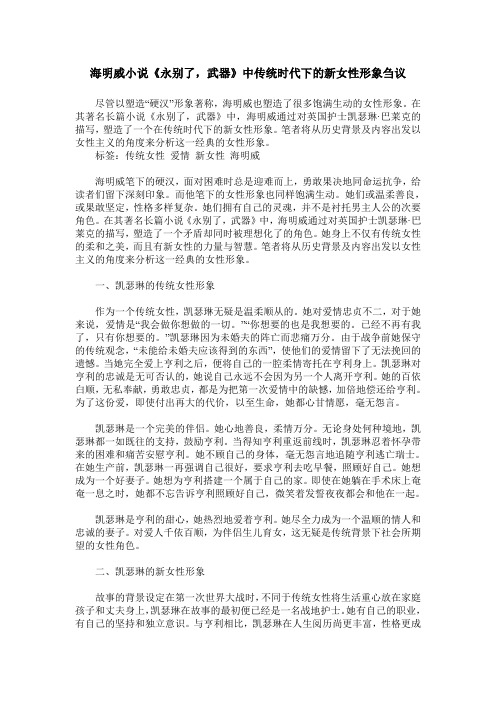
海明威小说《永别了,武器》中传统时代下的新女性形象刍议尽管以塑造“硬汉”形象著称,海明威也塑造了很多饱满生动的女性形象。
在其著名长篇小说《永别了,武器》中,海明威通过对英国护士凯瑟琳·巴莱克的描写,塑造了一个在传统时代下的新女性形象。
笔者将从历史背景及内容出发以女性主义的角度来分析这一经典的女性形象。
标签:传统女性爱情新女性海明威海明威笔下的硬汉,面对困难时总是迎难而上,勇敢果决地同命运抗争,给读者们留下深刻印象。
而他笔下的女性形象也同样饱满生动。
她们或温柔善良,或果敢坚定,性格多样复杂。
她们拥有自己的灵魂,并不是衬托男主人公的次要角色。
在其著名长篇小说《永别了,武器》中,海明威通过对英国护士凯瑟琳·巴莱克的描写,塑造了一个矛盾却同时被理想化了的角色。
她身上不仅有传统女性的柔和之美,而且有新女性的力量与智慧。
笔者将从历史背景及内容出发以女性主义的角度来分析这一经典的女性形象。
一、凯瑟琳的传统女性形象作为一个传统女性,凯瑟琳无疑是温柔顺从的。
她对爱情忠贞不二,对于她来说,爱情是“我会做你想做的一切。
”“你想要的也是我想要的。
已经不再有我了,只有你想要的。
”凯瑟琳因为未婚夫的阵亡而悲痛万分。
由于战争前她保守的传统观念,“未能给未婚夫应该得到的东西”,使他们的爱情留下了无法挽回的遗憾。
当她完全爱上亨利之后,便将自己的一腔柔情寄托在亨利身上。
凯瑟琳对亨利的忠诚是无可否认的,她说自己永远不会因为另一个人离开亨利。
她的百依白顺,无私奉献,勇敢忠贞,都是为把第一次爱情中的缺憾,加倍地偿还给亨利。
为了这份爱,即使付出再大的代价,以至生命,她都心甘情愿,毫无怨言。
凯瑟琳是一个完美的伴侣。
她心地善良,柔情万分。
无论身处何种境地,凯瑟琳都一如既往的支持,鼓励亨利。
当得知亨利重返前线时,凯瑟琳忍着怀孕带来的困难和痛苦安慰亨利。
她不顾自己的身体,毫无怨言地追随亨利逃亡瑞士。
在她生产前,凯瑟琳一再强调自己很好,要求亨利去吃早餐,照顾好自己。
永别了,武器(译文名著精选)

谢谢观看
5
第三十二章
1
第三十三章
2
第三十四章
3
第三十五章
4
第三十六章
5
第三十七章
第三十八章 第三十九章
第四十章 第四十一章
作者介绍
同名作者介绍
海明威(Ernest Miller Hemingway,1899年7月21日-1961年7月2日),生于美国芝加哥,美国**、作家, “新闻体”小说的创始人,笔锋以“文坛硬汉”著称,被认为是20世纪最著名的小说家之一。他凭借着《老人与 海》一书先后获得普利策奖、诺贝尔文学奖。他的作品《太阳照样升起》《永别了,武器》被美国现代图书馆列 入“20世纪百大英文小说”中。1961年7月2日,海明威在家中用猎枪自杀身亡,享年62岁。
《永别了,武器》是一部反战作品,是我心目中二十世纪以来最伟大的小说家之一海明威的作品。但在《永 别了,武器》这部作品中,海明威主要探讨的是“迷惘的一代”是如何形成的,他在这里给出的答案是“战争”, 虚假的宣传,崇高的口号和残酷的战争放在一起,当抽象的理想与鲜活的具体的人放在一起,只能显出抽象的虚 伪。我每逢听到神圣、光荣、牺牲等字眼和徒劳这一说法,总觉得局促不安。
永别了,武器(译文名著精选)
读书笔记模板
01 思维导图
03 读书笔记 05 目录分析
《永别了,武器》的叙事审美
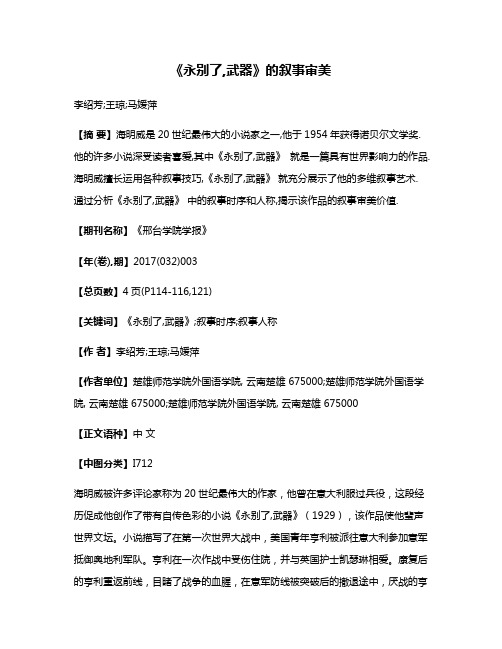
《永别了,武器》的叙事审美李绍芳;王琼;马媛萍【摘要】海明威是20世纪最伟大的小说家之一,他于1954年获得诺贝尔文学奖.他的许多小说深受读者喜爱,其中《永别了,武器》就是一篇具有世界影响力的作品.海明威擅长运用各种叙事技巧,《永别了,武器》就充分展示了他的多维叙事艺术.通过分析《永别了,武器》中的叙事时序和人称,揭示该作品的叙事审美价值.【期刊名称】《邢台学院学报》【年(卷),期】2017(032)003【总页数】4页(P114-116,121)【关键词】《永别了,武器》;叙事时序;叙事人称【作者】李绍芳;王琼;马媛萍【作者单位】楚雄师范学院外国语学院, 云南楚雄 675000;楚雄师范学院外国语学院, 云南楚雄 675000;楚雄师范学院外国语学院, 云南楚雄 675000【正文语种】中文【中图分类】I712海明威被许多评论家称为20世纪最伟大的作家,他曾在意大利服过兵役,这段经历促成他创作了带有自传色彩的小说《永别了,武器》(1929),该作品使他蜚声世界文坛。
小说描写了在第一次世界大战中,美国青年亨利被派往意大利参加意军抵御奥地利军队。
亨利在一次作战中受伤住院,并与英国护士凯瑟琳相爱。
康复后的亨利重返前线,目睹了战争的血腥,在意军防线被突破后的撤退途中,厌战的亨利逃离了军队。
他与恋人凯瑟琳一起逃到瑞士,在一个远离战争的地方安顿下来,但好景不长,凯瑟琳最终死于难产。
《永别了,武器》出版以来受到了学界经久不衰的关注。
Cain(2013)、李茜(2014)、陈晓日(2016)等从爱情视角探讨《永别了,武器》;Norris(1994)、吴建江(2014)等则是把《永别了,武器》当作战争小说来研究;Solotaroff(1989)、Traber(2005)、贺萍(2010)、黄芳(2012)等基于性别来分析《永别了,武器》。
其实,《永别了,武器》的叙事特色也是非常具有审美价值的,下面就从时序和人称维度来探究此作品的叙事艺术。
海明威的完美理想女性_浅析小说_永别了_武器_中的女主人公凯瑟琳

Vol.7No.112010年11月第7卷第11期Journal of Hubei University of Economics(Humanities and Social Sciences)湖北经济学院学报(人文社会科学版)Nov.2010海明威(1899~1961)是美国文学史上最重要的作家之一。
他出生在一个医生家庭,中学毕业后当过记者。
记者职业对文字、文体的要求对他日后作品的内容和文风产生了重大影响。
他简约有力的语言和深沉含蓄的艺术风格使他的作品极具鲜明的个性特征。
第一次世界大战中,海明威参加了志愿救护车队,在意大利前线被弹片击中负伤。
这段经历为他的名著《永别了,武器》提供了不可或缺的素材。
《永别了,武器》以第一次世界大战为背景,讲述了美国中尉亨利和英国护士凯瑟琳的爱情故事。
女主人公凯瑟琳是一位具有19世纪维多利亚时代传统美德的圣母型和天使般的女性人物。
未婚夫阵亡于前线使她精神崩溃,不能自拔。
后来在亨利那得到了爱情,唤起了她新的满腔柔情。
她善良柔弱,同时又疲惫惊惶,因而把人生的全部意义和希望寄托在亨利身上。
只要有了爱情她就能好好地活下去,无论去到了什么地方,她保准把那布置成温馨的家。
像这样一位忠实,善良,柔弱的女子是父权社会中带传统观念的男人心目中理想女性和完美妻子。
小说中的故事不仅展示了战争的残酷,也详述了海明威心中的完美理想女性。
随着女权主义文学批评的兴起,海明威受到了女权主义评论家的抨击,她们指责海明威维护传统的社会性别角色和性别歧视的模式,嘲讽其作品中的一些“驯服”的女主角成为男主人公的性工具是为了突出男子汉气质人为设计的陪衬角色。
但如果我们仔细研读海明威的作品就不难发现海明威的女性人物在其小说中具有重要的地位。
海明威身处在一个特殊的历史时期和社会环境,这个社会环境影响和形成了作家的性别观,而作家的性别观又在他刻画好的女性人物身上得到充分的体现。
在第一次世界大战前后时期,社会性别角色在美国和整个西方社会中正历经着转化;女性追求平等自由的呼声日益高昂,传统的以男性为主体的社会模式受到了挑战。
功能对等理论指导下对《永别了,武器》两个中译本的比较研究
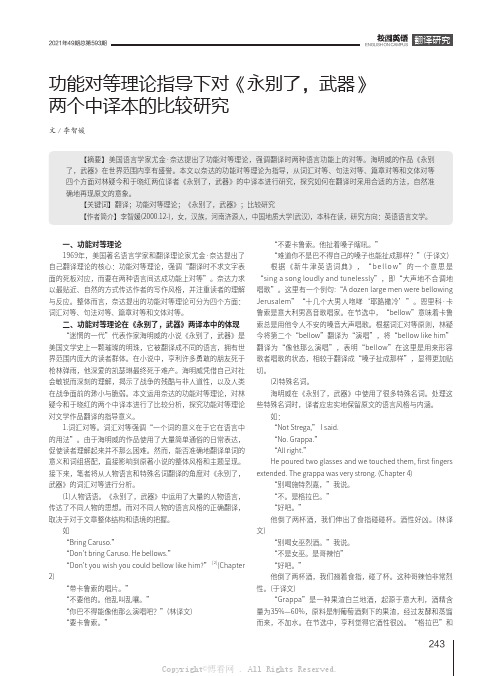
2021年49期总第593期ENGLISH ON CAMPUS【摘要】美国语言学家尤金·奈达提出了功能对等理论,强调翻译时两种语言功能上的对等。
海明威的作品《永别了,武器》在世界范围内享有盛誉。
本文以奈达的功能对等理论为指导,从词汇对等、句法对等、篇章对等和文体对等四个方面对林疑今和于晓红两位译者《永别了,武器》的中译本进行研究,探究如何在翻译时采用合适的方法,自然准确地再现原文的意象。
【关键词】翻译;功能对等理论;《永别了,武器》;比较研究【作者简介】李智媛(2000.12-),女,汉族,河南济源人,中国地质大学(武汉),本科在读,研究方向:英语语言文学。
一、功能对等理论1969年,美国著名语言学家和翻译理论家尤金·奈达提出了自己翻译理论的核心:功能对等理论,强调“翻译时不求文字表面的死板对应,而要在两种语言间达成功能上对等”。
奈达力求以最贴近、自然的方式传达作者的写作风格,并注重读者的理解与反应。
整体而言,奈达提出的功能对等理论可分为四个方面:词汇对等、句法对等、篇章对等和文体对等。
二、功能对等理论在《永别了,武器》两译本中的体现“迷惘的一代”代表作家海明威的小说《永别了,武器》是美国文学史上一颗璀璨的明珠,它被翻译成不同的语言,拥有世界范围内庞大的读者群体。
在小说中,亨利许多勇敢的朋友死于枪林弹雨,他深爱的凯瑟琳最终死于难产。
海明威凭借自己对社会敏锐而深刻的理解,揭示了战争的残酷与非人道性,以及人类在战争面前的渺小与脆弱。
本文运用奈达的功能对等理论,对林疑今和于晓红的两个中译本进行了比较分析,探究功能对等理论对文学作品翻译的指导意义。
1.词汇对等。
词汇对等强调“一个词的意义在于它在语言中的用法”。
由于海明威的作品使用了大量简单通俗的日常表达,促使读者理解起来并不那么困难。
然而,能否准确地翻译单词的意义和词组搭配,直接影响到原著小说的整体风格和主题呈现。
接下来,笔者将从人物语言和特殊名词翻译的角度对《永别了,武器》的词汇对等进行分析。
单独媾和的硬汉子——浅析《永别了,武器》
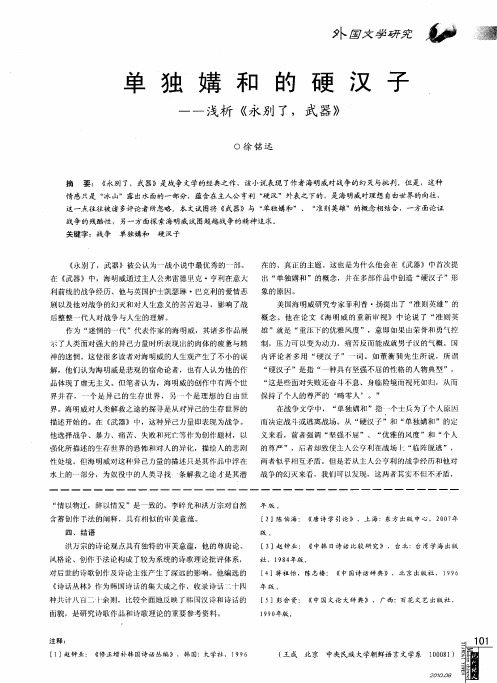
充满 凶 险 、暴 力和 死 亡 的世 界 。
在 《 弗雷 德里 克 ・ 利 的逃 跑和 消 极姿 态 》 一文 中 ,司 亨
可 能 的 , 甚 至 连 体 面 地 去 死 也 不 可 能一 一 战 争 已经 剥 夺 了
生 命 的神 圣 性 与 悲 剧 性 。认 识 到 这 ‘ , 亨 利 怒 不 可 遏 , 点
面 貌 ,是研 究 诗 歌作 和 诗歌 理 论 的重 要 参考 资 料 。
注释 :
[ 赵钟 业: 修正增 补韩国诗话丛编 ,韩 国:太学社 ,1 6 1] 9 9
( 王成 北京
中央民族大学朝鲜语言文学系 108 ) 001
溶 夕国 宄 卜文 研
反 而是 相 互推 动 的 。
作 为 “ 惘 的一 代 ”代 表 作 家 的海 明威 ,其诸 多作 品展 雄 ”就 是 “ 压 下 的优 雅风 度 ”,意 即如 果 由荣誉 和 勇气 控 迷 重 示 了人 类面 对 强大 的 异 己力 量 时所 表现 Ⅲ的 肉体 的 疲 惫与 精 神 的迷惘 。这使 很 多 读者 对 海 明威 的人 生 观产 生 了不 小 的 误 制 ,压 力可 以变 为动 力 ,痛 苦 反而 能 成就 男 子汉 的 气概 。国 内评 论 者 多 用 “ 汉 子 ”一 词 。 如 董 衡 巽 先 生 所 说 ,所 谓 硬 “ 汉 子 ”是 指 “ 种具 有 坚 强不 屈 的性 格 的人 物 典型 ”, 硬 一 “ 是些 面 对 失败 还 奋斗 不 息 、身 临 险境 而视 死 如 归 ,从 而 这
‘
“ 单独 媾 和 ”意 味着 新 生 活 的开始 。亨 利与 凯 瑟琳 重逢
后 的 第 一个夜 晚 , 屋外 淫 雨绵 绵 ,屋 内却 “ 明亮 、舒 适 、欢
《永别了,武器》两种中译本比较研究

∗∗∗第32卷第3期绥化学院学报2012年6月Vol.32No.3Journal of S uihua Univers ity Jun.2012《永别了,武器》两种中译本比较研究郑美香(福建江夏学院人文系应用外语教研室福建福州350108)摘要:《永别了,武器》是美国著名作家海明威的一篇重要小说。
以《永别了,武器》的两个中译本作为研究对象,从译文词语的选择、句法、人物身份与语言、特殊名词的翻译四个角度来探讨文学翻译中风格的可译性和译者的策略,以及海明威风格的保留与再现。
关键词:风格;词语的选择;句法;人物身份与语言;特殊名词中图分类号:H315.9文献标识码:A文章编号:2095-0438(2012)03-0138-04一、引言欧内斯特·海明威的文学作品被翻译成包括汉语在内的世界多国文字。
目前,国内外文学界对海明威的创作风格及其作品的美学内涵有诸多卓有成效的研究,但对其作品汉译研究的个案分析却有如凤毛麟角。
其长篇小说《永别了,武器》在中国经久不衰。
文章对《永别了,武器》原文部分代表性章节和两个代表性汉译本(林疑今译本和汤永宽译本)分别进行分析,旨在析出该小说在原文和译文各个语言层面上的表现及其异同,依此来比较两位译者在汉译过程中对海明威小说风格的保留与再现。
风格研究是文学翻译研究的重要议题。
译文与原文的交叉比较可以很好地检验译文在风格上对原文的忠实程度。
风格具有可译性,但要在一部译作中复制出原作的特征绝非易事。
翻译的最高境界是使译文的思想内容、文体风格乃至读者感受等方面与原文相同。
因此,译者在翻译过程中不应只追求自己的风格,而应兼顾作者的风格,以达到原作风格和译文风格的和谐统一。
刘宓庆在其专著《新编当代翻译理论》中列专章“翻译风格论”对翻译风格问题进行了理论上的探讨和论证。
他认为,风格翻译具有一定的原创性,但译文风格对原著风格即所谓“原型”存在相对的依附性,而翻译风格对原著风格的这种依附性就要求我们在进行语际间的风格意义转换时,最基本的也是首要的任务就是要发掘原语的全部风格意义。
文学类文本《永别了,武器》阅读练习及答案(2022届宁夏银川高三二模)
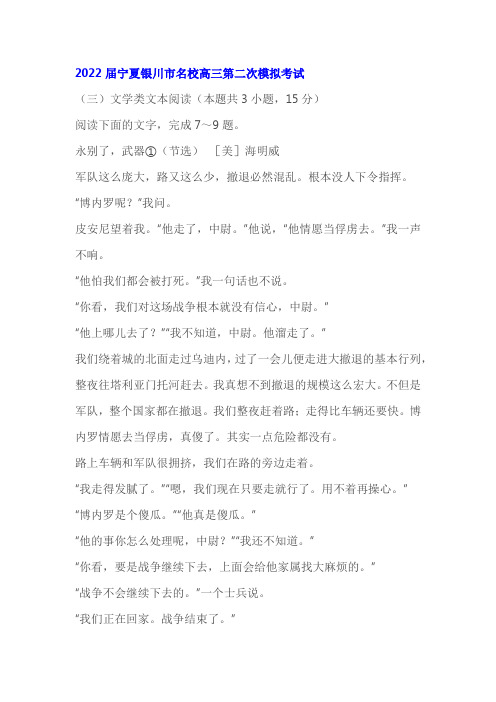
2022届宁夏银川市名校高三第二次模拟考试(三)文学类文本阅读(本题共3小题,15分)阅读下面的文字,完成7~9题。
永别了,武器①(节选)[美]海明威军队这么庞大,路又这么少,撤退必然混乱。
根本没人下令指挥。
“博内罗呢?”我问。
皮安尼望着我。
“他走了,中尉。
”他说,“他情愿当俘虏去。
”我一声不响。
“他怕我们都会被打死。
”我一句话也不说。
“你看,我们对这场战争根本就没有信心,中尉。
”“他上哪儿去了?”“我不知道,中尉。
他溜走了。
”我们绕着城的北面走过乌迪内,过了一会儿便走进大撤退的基本行列,整夜往塔利亚门托河赶去。
我真想不到撤退的规模这么宏大。
不但是军队,整个国家都在撤退。
我们整夜赶着路;走得比车辆还要快。
博内罗情愿去当俘虏,真傻了。
其实一点危险都没有。
路上车辆和军队很拥挤,我们在路的旁边走着。
“我走得发腻了。
”“嗯,我们现在只要走就行了。
用不着再操心。
”“博内罗是个傻瓜。
”“他真是傻瓜。
”“他的事你怎么处理呢,中尉?”“我还不知道。
”“你看,要是战争继续下去,上面会给他家属找大麻烦的。
”“战争不会继续下去的。
”一个士兵说。
“我们正在回家。
战争结束了。
”“要是战争真结束了,那就没有关系了,”皮安尼说,“但是我不相信战争已经结束。
真这样就太好啦。
”“我们不久就会知道的。
”我说。
“我不相信战争结束。
他们都这样想,我可不相信。
”天亮前,我们赶到了塔利亚门托河的河岸边,便沿着涨满水的河走,走近一条所有的人马要过的桥。
我们沿着河岸走,然后挤进了过桥的人群。
我紧紧地央在人群中慢慢地过桥,上面是雨,下边隔着几尺便是河水,我从桥边探头望望河水。
没人说话。
大家只希望快点过桥,心里就是这么个念头。
我们快过去了。
木桥的那一头,两边站有一些军官和宪兵,打着手电简。
我们走近他们时,我看见有个军官用手指指队伍中的一个人。
一名宪兵走进行列,抓住那人的胳膊,拖了出去。
宪兵强迫他离开大路。
他们正仔细察看着行列中的每一个人。
我们刚要走到正对面时,他们又抓去了一个人。
人性的摧残 和平的渴望——海明威《永别了,武器》主题研究
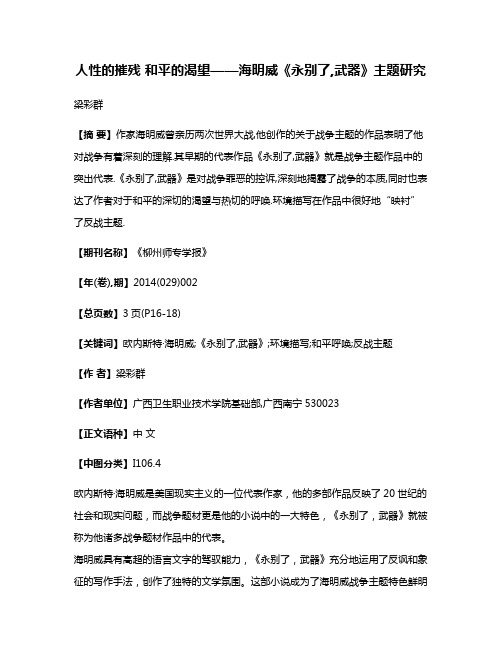
人性的摧残和平的渴望——海明威《永别了,武器》主题研究梁彩群【摘要】作家海明威曾亲历两次世界大战,他创作的关于战争主题的作品表明了他对战争有着深刻的理解.其早期的代表作品《永别了,武器》就是战争主题作品中的突出代表.《永别了,武器》是对战争罪恶的控诉,深刻地揭露了战争的本质,同时也表达了作者对于和平的深切的渴望与热切的呼唤.环境描写在作品中很好地“映衬”了反战主题.【期刊名称】《柳州师专学报》【年(卷),期】2014(029)002【总页数】3页(P16-18)【关键词】欧内斯特·海明威;《永别了,武器》;环境描写;和平呼唤;反战主题【作者】梁彩群【作者单位】广西卫生职业技术学院基础部,广西南宁530023【正文语种】中文【中图分类】I106.4欧内斯特·海明威是美国现实主义的一位代表作家,他的多部作品反映了20世纪的社会和现实问题,而战争题材更是他的小说中的一大特色,《永别了,武器》就被称为他诸多战争题材作品中的代表。
海明威具有高超的语言文字的驾驭能力,《永别了,武器》充分地运用了反讽和象征的写作手法,创作了独特的文学氛围。
这部小说成为了海明威战争主题特色鲜明的作品。
作者曾经参加过两次世界大战和西班牙内战,以战地记者的身份近距离目睹了战争的发生和发展,这使得他对战争有着较为深刻的认识。
他认为战争不仅在物质上和生活给人们带来了巨大的灾难,而且对人们心灵和精神都造成了极大的摧残。
他把自己的情感投射到作品中,《永别了,武器》通过对主人公亨利经历的描述来表达反战思想,小说以其对和平的深切向往深深地打动着中外读者。
在小说中,主人公亨利是一个被统治者灌输着“爱国主义”理想的青年,在投身理想的动机的驱动下,他自愿地加入到意大利和奥地利的战争中。
但是,随着时间的推移,随着战争的发展,他身上的浪漫主义情怀逐渐地被对生命的麻木所取代,也正是在这种变化中作者揭示了战争的罪恶本质。
(一)战争对人们精神意志的摧残在小说开始的部分,一个激情澎湃的青年亨利带着爱国主义的浪漫情怀积极地投身到战争中去,那时的他一腔热血,热切希望在战争中实现自己的人生价值。
永别了武器中“雨”的意象
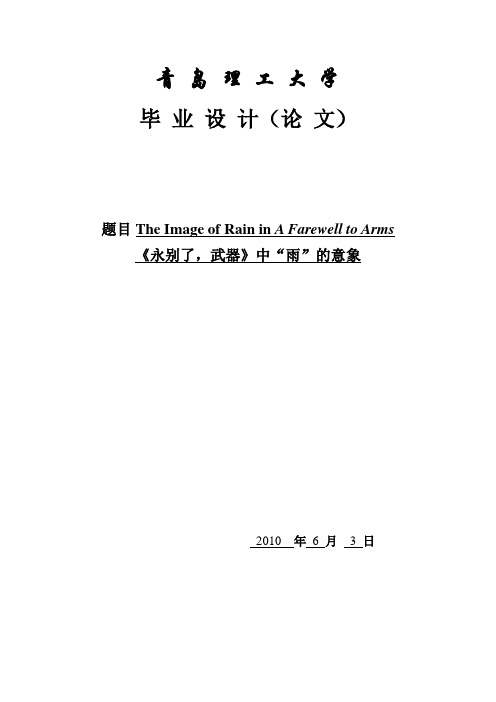
青岛理工大学毕业设计(论文)题目The Image of Rain in A Farewell to Arms 《永别了,武器》中“雨”的意象2010 年6 月 3 日摘要《永别了,武器》是美国小说家欧内斯特·海明威的代表作。
他运用严峻的现实主义结合富有诗意的语言,对战争作了有力的抨击,同时向读者讲诉了一个动人的爱情故事。
本文以对文中“雨”的意象分析为基础来研究《永别了,武器》。
文中的不同场景下的“雨”不仅向我们展示了绝望,抑郁,悲伤,离别,焦虑,无助,而且还有死亡...本论文按小说故事情节的发展分为五个部分,从对作者及其作品的简要分析着笔,在向读者简单介绍作品情节的基础上逐一对文中男女主人公相遇,相识,相知,分别,重逢,永别等不同场景中的“雨”进行了剖析。
结合不同场景中“雨”所反映出的不同意象探索小说的主题——战争摧毁了人类的幸福。
文章标题点明告别了硝烟弥漫的战场,实际上,也暗示着告别爱情,由此推出“迷惘的一代”对“厌恶战争,呼吁和平”的衷心呼唤。
KEY WORDS: 永别了武器,雨,意象,死亡,分别,战争,和平ABSTRACTA Farewell to Arms as the representative work of Ernest Hemingway is a combination of realism and poetic language presenting a powerful argument against war and telling a touching love story at the same time. This paper will make a thematic study on A Farewell to Arms based on the analysis of the image of rain in the novel. The image shows us not only the desperation, depression, sentiment, parting, anxiety, helplessness ,but also death…The exploration of t he theme is made in five parts with the development of the plots. Starting from the brief analysis of the author and the work, the paper analyzes “rain” in the different scenarios of the story involving the hero and heroine‟s encounter, acquaintance, departure, reunion and farewell. The image of rain in the different scenarios of the story is used to strike directly to the subject of the novel that is war destroys human being‟s happiness. The title reveals that it is a story showing a farewell to battlefield, in fact it demonstrates a farewell to love, which, in turn expresses the heartfelt desire of the “Lost Generation”at that time —“aversion to war and call for peace”.KEY WORDS: A Farewell to Arms, rain, image, death, parting, war, peaceContentsIntroduction (8)Chapter One A Brief Introduction to the Author and the Novel (10)1.1 Brief introduction to Ernest Hemingway‟s life (10)1.2 About the novel (11)1.2.1 Outline of the novel (11)1.2.2 The style and structure of the novel (12)Chapter Two Image of Rain Reflecting Desperation, Depression and Sentiment..(14)2.1 The rain in nature, in the war and in the hospital (14)2.2 The symbolism of the rain (14)Chapter Three Image of Rain As a Symbol of Departure (16)3.1 The rain in the railway station (16)3.2 The symbolism of the rain (16)Chapter Four Image of Rain Reflecting Anxiety and Helplessness (18)4.1 The rain during their boating to Switzerland (18)4.2 The symbolism of the rain (18)Chapter Five Image of Rain Symbolizing Death (20)5.1 The rain in the child‟s birth and after Catherine‟s death (20)5.2 The symbolism of the rain (20)Conclusion (22)Acknowledgements (23)Bibliography (24)IntroductionCreated by mankind with their own created weapons, war is still an inevitable topic of today's world. Ernest Hemingway, one of the most famous American writers of the 20th century, wrote “A Farewell to Arms” in a good wish. He wrote novels and short stories about outdoorsmen, expatriates, soldiers and other men of action. He took much of his life story line to his novel. His main representatives are The Old Man and the Sea, The Sun Also Rises, For Whom The Bell Tolls, In Love and War etc.A Farewell to Arms is his well-known early masterpiece. The novel, a love story, draws heavily on Hemingway's experiences as a young soldier in Italy. It tells the story of Lieutenant Frederic Henry, a young American ambulance driver serving in the Italian army during World War I. After Henry is wounded at the front by a trench mortar shell, he falls in love with the British nurse, a girl called Catherine Barkley who tends to him in the hospital during his recuperation, and their relationship develops. His recuperation and romance with the now pregnant Catherine ends abruptly when Henry must return to the front. Henry narrowly escapes death at the hands of Italian soldiers who are executing officers separated from their troops during the Italians' disastrous retreat following the Battle of Caporetto. He finds Catherine, and after a sojourn in an Italian resort, the couple flee to Switzerland on the eve of Henry's arrest for deserting. In Switzerland, their child is born dead, and Catherine dies shortly after due to hemorrhages. The novel has won many readers by its refined, simple writing style, and the use of symbolic writing style endows the works with rich connotation and imagination. In the text, he applies symbolism to different scenes which suggests the tragic atmosphere of the novel and endows rain with different kinds of implications to highlight the ruthless, sad, miserable and desolate atmosphere of the war, in which the people's depression, repression, sadness, helplessness and desperation are set off. At the same time, the author tells the story about the hero's feeling towards the cruel war which deprives human lives and happiness and brings along disaster and grieves.Many experts have probed into this topic, they have a lot of different opinions about the implications of the Rain. This paper is intended to do deeper research and show a specific view. It focuses on "Rain" in different scenarios of the story to show the various images of “Rain”: desp eration, depression, sentiment, parting, anxiety, helplessness and death.The research is meaningful because it is useful for us to grasp the direction of the novel. We can save our time and energy in the road of researching the meaning of literature in our modern times. By better understanding the voice--- “aversion to war and call for pea ce” of the “Lost Generation”, people can deeply intensify their understanding of the meaning of peace in modern society.Chapter One A Brief Introduction to the Author and the NovelHemingway is seen to be the representative of the "Lost Generation" writers of literary genres, and his novel A Farewell to Arms is also increasingly recognized as the outstanding masterpiece of him. This work, in addition to realistic description writing as well as his cable-style simple, subtle style under his "iceberg" theory, has more fascinating symbols.1.1 Brief introduction to Ernest Hemingway’s lifeErnest Hemingway was born in Oak Park, near Chicago on July 21, 1899. His father, a well-to-do physician bequeathed his son a way of life, and of death, initiated him into the rituals of hunting and fishing in the Upper Peninsula of Michigan.After graduation Hemingway worked as a reporter in 1917, and he learnt a great deal about exactness and style in reporting at that time. But World War I absorbed this boy‟s attention, as a youth of 18, Ernest Hemingway was eager to fight in the Great War. Poor vision kept him out of the army, so he joined Italian Red Cross, and became a driver of a volunteer unit in France. During that war, Hemingway experienced two important things that could be never forgotten in his life. One of them was his wound in the leg which made him become the first American wounded in that country. He suffered serious injuries; the doctor gave him as much as thirteen operations, and took out 227 shrapnel and bomb chips from his body. But there were still about ten ones, which could not be taken out, they only had to let them stay in his body until he died. To the doctors‟ surpri se, this wounded survived magically in the end. While living in a hospital in Milan, Hemingway met with an American nurse who was several years older than he, named Agnes, who became the archetype of the heroine in A Farewell to Arms. The meeting was the second unforgettable thing in his life during the World War I. With Agnes, Hemingway began his first love, but the lady married another man after the war. That made Hemingway feel very angry and have a feeling of being cheated, and this thing also affected the models of women characters in his later novels. In fact his first wife was several years older than him.Later, while working in Paris as a correspondent, he became involved with the expatriation and artistic circle surrounding Gertrude Stein. During the Spanish Civil War, Hemingway served as a correspondent on the loyalist side. He fought in World War II and then settled in Cuba in 1945. In1954, Hemingway was awarded the Nobel Prize for literature. After his expulsion from Cuba by the Castro regime, he moved to Idaho. In his life, Hemingway married four times and wrote numerous essays, short stories and novels. The effects of Hemingway‟s lifelong depressions, illness and accidents caught up with him. In July 1961, he committed suicide with his dear double-tube hunting gun in Ketchum, Idaho.Hemingway is a representative writer of the “Lost Generation” after the World War I. His philosophy on life approximates to the theory of the jungle justice and survival of the fittest. He believes that the life is incomparably cruel, and the peaceable period is just the continuation of the war. But he still believes that there are many beautiful things, which could be used to ease the sadness in the world. Despite the bloody massacre of the war, love could also serves as a go-between to get rid of the pain.1.2 About the novelA Farewell to Arms as one of Ernest Hemingway‟s early famous novel announces Hemingway‟s opposition to wars. The author wrote the novel by adopting the first call to narrate the story.1.2.1 Outline of the novelLieutenant Frederic Henry, the protagonist is a young American attached to an Italian ambulance unit on the Italian front. When Henry returne to the front he learned from his friend, Lieutenant Rinaldi, that a group of British nurses have arrived during his absence to set up a British hospital unit. Rinaldi introduce him to a nurse named Catherine Barkley.The two soon fall in love with each other. Before Henry leave for the front to stand by for an attack, Catherine give him a St. Anthony medal.At the front, as Henry and some Italian ambulance drivers are eating in a dugout,an Austrian projectile explore over them. Henry, badly wounds in the legs, be taken to a field hospital. Later he is moved to a hospital in Milan. While he is in hospital, Catherine often comes to his ward, which helps Henry getting rid of his restlessness and loneliness. After his operation, Henry convalesces in Milan with Catherine Barkley as his attendant. Together they dine in out of the way restaurants, and together they ride about the countryside in a carriage. Summer passes into autumn. Henry‟s wound has healed and he is due to take convalescent leave in October. He and Catherine plan to spend the leave together, but he come down with jaundice before he can leave the hospital. Before he recovers and ready to leaves for the front, Henry and Catherine stay together in the hotel room, already she has disclosed to him that she is a pregnant. When Henry return to the battlefield, the war is going bad in Italy. The German troops force a full-scale retreat. Then Henry deserts the war in a daring escape. He leaves and meets Catherine in Stresa. The two go over to Switzerland where they spend an idyllic time waiting for the birth of their baby. Catherine has had a long and difficult labor. Their baby is delivered dead. Catherine dies soon after from “one hemorrhage after another”. After Catherine‟s death, Henry le aves and walks back to his hotel.1.2.2 The style and structure of the novelWar and love are obviously two important themes in the book. In the first two parts we are in the war which is overwhelming. In the last two parts we are in love. And, just as the first two parts are prepared with love in the time of war, the last two parts are tinged with war in the time of love. The third part is the bridge between the two …stories‟ and it is not surprising that it centers on the escape. It is during the escape that Henry resolves that he is through with the war (a war in which he really has no place) and decides that all he wants is to be with Catherine.Hemingway‟s declarative, terse prose serves him well in this novel. It enables our narrator to be initially detached from life, and also serves to paint an uncompromising picture of the war. Additionally, it is used to produce a realistic narrative from Henry‟s point of view, shying away from elaborate schemes anddescriptions. Because of it, nothing in the novel is romanticized. The love between Henry and Catherine is an elegant one, and in Hemingway‟s hands it becomes m ore of a function of existence rather than the primary focus of the novel.Readers will not fail to notice the humor, which Hemingway manages to gleam despite the seriousness of his topic.( Carson,1972:22).Chapter Two Image of Rain Reflecting Desperation,Depression and SentimentThe image of "Rain" runs through the whole passage, service for the two themes—Disaster and Death. It is the accumulating and condensing process with the time transferring and space continuing. The symbolism of the rain changes with the hero‟s fate.As a kind of set-off of the symbolism, the use of rain receives high praise. In fact, it is just likes a refrain which is always sung wherever it is needed.At the very beginning of the novel rain goes…2.1 The rain in nature, in the war and in the hospital“……The rain begins to fall in the October…the leaves all fell from the trees and the branches were bare and the trunks black with rain…all the country wet and brown and dead with the autumn……”(Ernest Hemingway,1987:5).“……At the start of the winter came the permanent rain and with the rain came the cholera. But it was checked and in the end only seven thousand died of it in the army……” (Ernest Hemingway, 1987:8).“……I am afraid of the rain because sometimes I see myself dead in it……”(Ernest Hemingway, 1987:19).“……It turned cold that night and the next day it was raining. Coming home from the Ospedale Maggiore it rained very hard and I was wet when I came in. Up in my room the rain was coming down heavily outside on the balcony, and the wind blew it against the glass doors……” (Ernest Hemingway, 1987:36).2.2 The symbolism of the rainThe rain always shows us something sad and is always related to some disaster. As the quotation above shows us, the troops march silently in the rain and the war goes badly from the very beginning of the novel, the rain has set a basic tone ofdesperation, depression. It means the result of the war is a failure and the effect of the war is quite bad. The war brings nothing but desperation, depression, and sentiment.As rain falls, the leaves fall following it, the rain clearly symbolizes desperation.A kind of feeling that life is sick in the control of the external environment, such as the war, the natural disasters. Now the fate of the people is just like the falling leaves in the wind , in no way can they succeed with their struggle. The rain symbolism is not entirely a literary conceit, as rain actually precedes an outbreak of fatal illness, the cholera instead of the battle field kills seven thousand.Later during their Milan idyll, when Catherine says that she is afraid of rain, she shows the sentiment atmosphere, at the same time it sets a prelude for her death on a rain day at last.When Henry is wounded and receives treatment in Milan, he and Catherine spend a happy time. But the weather changes with the coming of Henry‟s return to the front, it rains, that is a symbol of the following disaster in the future.The author is really a superior in writing skill. The fate of the hero changes with the change of the weather, it makes the image of “rain” clear in the readers‟ eyes. The author only describes the environment at the very beginning, without any emotion in it, but the emotion in the hero is quite clear for any of the reader, that changes from hopeful to desperation, Depression and at last to sentiment. Only a few words for environment are sufficient to show a clear meaning for all the readers and it resonates.Chapter Three Image of Rain As a Symbol of DepartureAs happy days go and the day that Henry should go back to the front comes, rain in the novel also comes.3.1 The rain in the railway station“……The waiter came and took away the things. After a while we were very still and we could hear the rain……”(Ernest Hemingway, 1987:89).“……I saw the carriage coming. It stopped, the horse's head hanging in the rain, and the waiter stepped out, opened his umbrella, and came toward the hotel. We met him at the door and walked out under the umbrella down the wet walk to the carriage at the curb. Water was running in the gutter…”(Ernest Hemingway, 1987:93).“……I stepped out into the rain and the carriage started. Catherine leaned out and I saw her face in the light. She smiled and waved. The carriage went up the street, Catherine pointed in toward the archway. I looked, there were only the two carabineers and the archway. I realized she meant for me to get in out of the rain. I went in and stood and watched the carriage turn the corner……” (Ernest Hemingway, 1987:115).3.2 The symbolism of the rainHappy time has gone, all will go as before in the war and departure is following with the rain. That night Henry will go back to the front is the last night before their departure. During Henry and Catherine‟s trip from the armorer‟s to the hotel near the station on his last night with her, “There was a fog in the square and when we came close to the front of the cathedral it was very big and the stone was wet.”—the fog that has covered the city from the start of the second chapter turns to rain, all are wet now together with the hero‟s mood, and also it means something, so the novel says that it was a long ride to the station up side streets in the rain.(Ernest Hemingway, 1987:107). It continues to rain as they bid one another farewell, maybe rain isintended to express a will to stop their farewell. In fact, Catherine‟s last act in this part of the novel is to signal to Henry that he should get in out of the rain.Also a rainy day, at the train station, no crying for departure, only smiling and waving after the train gone. But all of these happened in the rain. The rain here is the signal of tragedy, it announces the lovers‟ departure and indicates the bad fate of their future. At the same time departure is not the most important thing, the following disease is really hard and no one knows after the departure what will happen in the rain. They must face the disease just as they can do nothing for the falling of the rain.Here the rain also indicates the destruction of war on the good love, and set a prelude for the plots following.Chapter Four Image of Rain Reflecting Anxiety andHelplessnessAs Henry goes back to the front , he finds no soon all changes, and all is set in a dilemma situation, and the situation is bad for them, now what they should do is not waiting to die but to run off. He is lucky that he does n‟t die and fle es successfully. Then he finds Catherine, but he is also in danger, he should continue to flee, that is a disaster, and rain foll ows…4.1 The rain during their boating to Switzerland“……That night there was a storm and I woke to hear the rain lashing the window-panes. It was coming in the open window. Some one had knocked on the door…...” (Ernest Hemingway, 1987:186).“……I dressed hearing the rain on the windows. I did not have much to put in my bag…...” (Ernest Hemingway, 1987:187).4.2 The symbolism of the rainIt rains almost continuously during this chapter when the battle turns and the Italians begin their retreat from Caporetto---and from the Germans who have joined the fighting. The rain turns to snow one evening, holding out hope that the offensive will cease, but the snow quickly melts and the rain resumes. The inner emotion in the hero‟s heart breaks out just like the heavily falling rain. Henry experience the death in the war and the retreat, he gets more about views of love and life, he now says goodbye to the evil war and cherishes more the love between Catherine and him. He flee to find his love but danger is following them just like the continued rai n—no ending. At the night of their fleeing to Switzerland, there is a big storm and it is falling until they get to Switzerland and dwell upon the mountains. The rain appears once more with the danger, anxiety and helplessness. But all of them think that “rain” will stop, but it doesn‟t, the fate of Henry and Catherine is just like struggling harder andharder on a rainy day, but no one but only themselves can help them, and they try their best to save their lives in the bad fate and also in the rain. Maybe running off to Switzerland is the best way for them to have a new life with sunshine and small Catherine every day, but no one knows when the rain will stop and when the anxiety and helplessness of Henry and Catherine will stop. The rain is going on falling and the happiness they wish is just like flash in the pa n—too short.Chapter Five Image of Rain Symbolizing DeathRain never stops in the couple‟s new life, with the coming of small Catherine, the rain also falls…5.1 The rain in the child’s birth and after Catherine’s death“……He hurried in. I walked up and down the hall. I was afraid to go in. I looked out the window. It was dark but in the light from the window I could see it was raining…...” (Ernest Hemingway, 1987:236).“……I sat down on the chair in front of a table where there were nurses' reports hung on clips at the side and looked out of the window. I could see nothing but the dark and the rain falling across the light from the window……” (Ernest Hemingway, 1987:269).“……I went down the hall and then down the stairs and out the door of the hospital and down the dark street in the rain to the café…...”(Ernest Hemingway, 1987:283).“…..But after I had got them out and shut the door and turned off the light it wasn't any good. It was like saying good-by to a statue. After a while I went out and left the hospital and walked back to the hotel in the rain…...”(Ernest Hemingway, 1987:294).5.2 The symbolism of the rainIn Switzerland, the couple live a happy life, but happiness is always so short, “It was raining high up the mountain.(Ernest Hemingway, 1987:197) following the rain disease comes. It rained for three days, so long for this couple, just like the long-time war, but they believe happiness is always coming after the rain, they believe they farewell to the battlefield they can live their own life without any destruction.“……The train stopped in Vevey, then went on, passing the lake on one side and on the other the wet brown fields and the bare woods and the wet houses. We cameinto Lausanne and went into a medium-sized hotel to stay. It was still raining as we drove through the streets and into the carriage entrance of the hotel. I looked out at the rain falling in the fountain of the garden…...”(Ernest Hemingway, 1987:217). Wherever the couple flee to, there is rain together with them. But “good news”comin g—the childbirth comes, and when Catherine is in hospital, it rains harder and harder, and Catherine is weaker and weaker, they all try their best to welcome the new life , but at last all are in vain, the child is declared to death with the rain. Though they are sad, they can not help. All people think that no worse thing will happen in this bad family. Finally when Henry leaves the hospital for lunch, the novel says “Suddenly I knew I had to get back. I called the waiter, paid the reckoning, got into my coat, put on my hat and started out the door. I walked through the rain up to the hospital……(Ernest Hemingway, 1987:286)” sad news comes, his love is dying with the rain falling too, Catherine dies, and the small Catherine dies, all on a rainy day. This takes the novel to the climax; Henry goes out without crying, only with rain falling. The ending is so simple but it just shows the writing style of Hemingway:emotional restraint and “Zero”at the end. Henry is an image of tough guy in Hemingway‟s novel, his sentimental emotion doesn‟t break out just like the volcano, only a series of heartless and numbing action. And rain is the victor of the emotion, and all emotions are expressed silently and heartily with the rain. On the other hand this ending with rains provide the reader with a scope to think, the evil war is the basic of all of the result, it is just like the heavy rain which becomes flood, and destroys all of the humanity.All in all, rain is not only a refrain, though Henry and Catherine flee to Switzerland and their baby small Catherine is coming, it is also the important symbol of death. Catherine once says she is afraid of rain because she sees herself dead in it .And later she really dies in the rain.Henry, Catherine and small Catherine are innocent in the war and the rainy day, but fate does not shows mercy to anybody in the war, all have one same resul t—death.ConclusionThis paper makes a thematic study of A Farewell to Arms based on the analysis of the image of rain in the novel. It strongly shows us the cruelty of nature, with love as the human‟s struggle against the indifference of nature. In the novel, rain is not only a simple natural phenomenon but also a sign of the hero‟s encounter. War and death are two main lines combining all the rain together to show the hero‟s depression, helplessness etc... The rain in the war implies a result of failure, and the rain in the hospital shows a feeling of depression. The rain is also falling down in their departure, in their boating to Switzerland. Then all come to the climax and also to the en d—their child is born dead and Catherine dies with it. From the beginning of the novel to the end, the rain falls constantly. Whenever the terror and disaster comes, it rains. It is just like a refrain accompanying the rain melody and helping express the theme of the story through the skillful use of the rain.Throughout the whole story, Hemingway writes the process of participation, suspicion, aversion and numbness of the destructive war, reflecting the cynicism and a crisis of faith in “Lost Genera tion” in the First World War. Although with aversion to war, they can‟t stop the war, can‟t see the hope, but are not willing to abandon the hope…Individuals can not find a way out in despair.Hemingway puts a lot of preludes and rendering for development of the tragedy from the events, characters and atmosphere, such as the kind of cold, bleak atmosphere accompanying the hero, constant falling rain, Henry's gloomy mood. Catherine‟s ominous, they are both moved by their sincere love, at the same time worried about their fates. Hemingway emphasizes on individual pursuing of happiness, then by describing this personal happiness which is destroyed, he makes the reader aware that the war is becoming increasingly horrific and evil. Based on this, the combined rain in the process of life development is meaningful and symbolic.Rain is falling, sorrow is going on stil l—never ends, though farewell to arms, farewell to love, never farewell to the depression, parting, helpless and death…AcknowledgementsIt is really a glorious task for me to write this research paper during the end of my study in this university.I am greatly indebted to all my teachers from the bottom of my heart. During the four years of study in the university, they have given me great assistance. They are my teachers as well as my friends. I have learnt not only the academic knowledge but the way to be a useful person. I really appreciate them.I give my sincerely thanks to my supervisor Mr. Gao Gongshe. In the process of the thesis writing, he gives me lots of suggestions, and very willingly revised my paper again and again. He is never impatient on the mistakes in the thesis, and without his help, it could not have come into form.Thanks for all my friends and classmates for collecting information and paper materials for me.Thanks for my deeply loved parents, without whose love and encouragement, I could not have finished my study in the university. Four years‟ education in Qingdao Technological University is my precious wealth.。
论_永别了_武器_中的悲剧美学意蕴
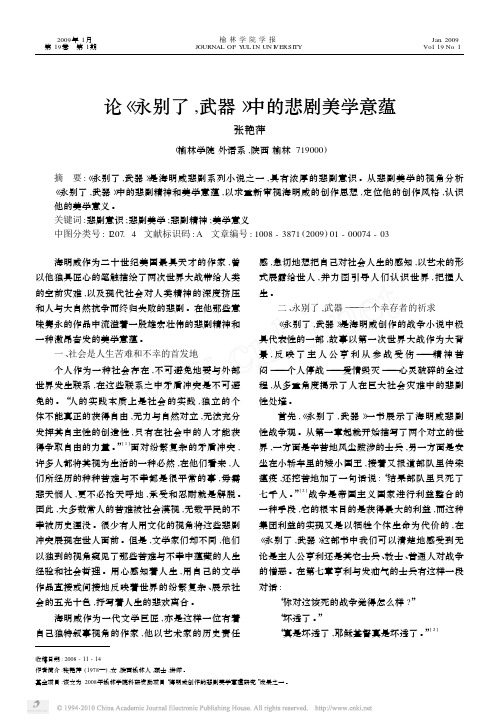
收稿日期:2008-11-14作者简介:张艳萍(1978—),女,陕西榆林人,硕士,讲师。
基金项目:该文为2008年榆林学院科研资助项目“海明威创作的悲剧美学意蕴研究”成果之一。
论《永别了,武器》中的悲剧美学意蕴张艳萍(榆林学院外语系,陕西榆林719000)摘 要:《永别了,武器》是海明威悲剧系列小说之一,具有浓厚的悲剧意识。
从悲剧美学的视角分析《永别了,武器》中的悲剧精神和美学意蕴,以求重新审视海明威的创作思想,定位他的创作风格,认识他的美学意义。
关键词:悲剧意识;悲剧美学;悲剧精神;美学意义中图分类号:I 207.4 文献标识码:A 文章编号:1008-3871(2009)01-00074-03 海明威作为二十世纪美国最具天才的作家,曾以他独具匠心的笔触描绘了两次世界大战带给人类的空前灾难,以及现代社会对人类精神的深度挤压和人与大自然抗争而终归失败的悲剧。
在他那些意味隽永的作品中流溢着一股雄宏壮伟的悲剧精神和一种激昂奋发的美学意蕴。
一、社会是人生苦难和不幸的首发地个人作为一种社会存在,不可避免地要与外部世界发生联系,在这些联系之中矛盾冲突是不可避免的。
“人的实践本质上是社会的实践,独立的个体不能真正的获得自由,无力与自然对立,无法充分发挥其自主性的创造性,只有在社会中的人才能获得争取自由的力量。
”[1]面对纷繁复杂的矛盾冲突,许多人都将其视为生活的一种必然,在他们看来,人们所经历的种种苦难与不幸都是很平常的事,毋需悲天悯人,更不必抢天呼地,承受和忍耐就是解脱。
因此,大多数常人的苦难被社会漠视,无数平民的不幸被历史湮没。
很少有人用文化的视角将这些悲剧冲突展现在世人面前。
但是,文学家们却不同,他们以独到的视角窥见了那些苦难与不幸中蕴藏的人生经验和社会哲理。
用心感知着人生,用自己的文学作品直接或间接地反映着世界的纷繁复杂、展示社会的五光十色,抒写着人生的悲欢离合。
海明威作为一代文学巨匠,亦是这样一位有着自己独特叙事视角的作家,他以艺术家的历史责任感,急切地想把自己对社会人生的感知,以艺术的形式展露给世人,并力图引导人们认识世界,把握人生。
从《永别了,武器》中读海明威的反战观

从《永别了,武器》中读海明威的反战观黄芳【摘要】海明威是西方文学史上最杰出的小说家之一。
他的《永别了,武器》被认为是一部当代文学杰作,这部作品成功地描写了一战及其对青年人造成的精神上和肉体上的伤害,这种伤害是不可磨灭、不可愈合的。
《永别了,武器》是一部反战题材小说,通篇都弥漫着反战思想,作品描述了战争的罪恶和残酷无情,它剥夺了人类的幸福。
同时这也是一部自传体小说,作品中的主人公亨利就是海明威的真实写照。
海明威以严峻的现实主义结合富有诗意的语言,对战争作了有力的抨击。
%Ernest Hemingway is one of the most outstanding novelists in the history of western literature.His A Farewell to Arms is considered as a great masterpiece which describes the First World War and its lasting effect on the young generation both physically and psychologically.A Farewell to Arms is a anti-war novel which explores that war is an iniquity,in which the cruelty and inhumanity can be found everywhere.It deprives people of their life and happiness.The antiwar attitude is perceived throughout the novel.It is also an autobiographical novel,in which Henry is the incarnation of the author himself.Hemingway combines austere realism and poetic language to present a powerful argument against war.【期刊名称】《商丘职业技术学院学报》【年(卷),期】2012(011)003【总页数】2页(P74-75)【关键词】海明威;反战观;残酷无情【作者】黄芳【作者单位】福建师范大学,福建福州350007 闽南理工学院,福建石狮362700【正文语种】中文【中图分类】I106.4欧内斯特·米勒尔·海明威(Ernest Miller Hemingway,1899~1961),20世纪美国最负盛名的作家,1954年的诺贝尔文学奖获得者。
《永别了,武器》中三对象征意义的分析
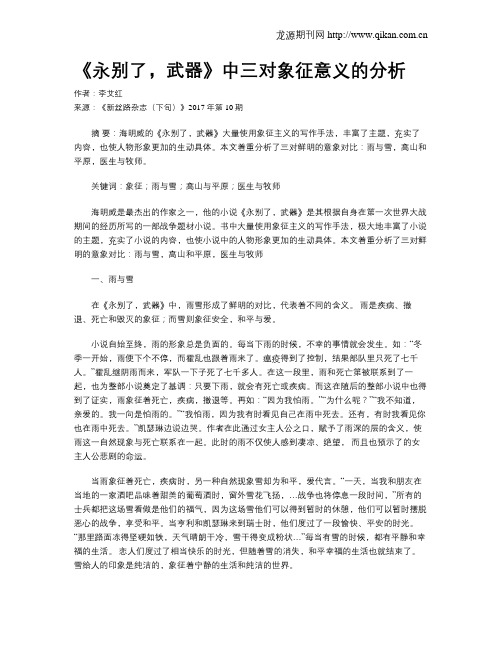
《永别了,武器》中三对象征意义的分析作者:李艾红来源:《新丝路杂志(下旬)》2017年第10期摘要:海明威的《永别了,武器》大量使用象征主义的写作手法,丰富了主题,充实了内容,也使人物形象更加的生动具体。
本文着重分析了三对鲜明的意象对比:雨与雪,高山和平原,医生与牧师。
关键词:象征;雨与雪;高山与平原;医生与牧师海明威是最杰出的作家之一,他的小说《永别了,武器》是其根据自身在第一次世界大战期间的经历所写的一部战争题材小说。
书中大量使用象征主义的写作手法,极大地丰富了小说的主题,充实了小说的内容,也使小说中的人物形象更加的生动具体。
本文着重分析了三对鲜明的意象对比:雨与雪,高山和平原,医生与牧师一、雨与雪在《永别了,武器》中,雨雪形成了鲜明的对比,代表着不同的含义。
雨是疾病、撤退、死亡和毁灭的象征;而雪则象征安全,和平与爱。
小说自始至终,雨的形象总是负面的。
每当下雨的时候,不幸的事情就会发生。
如:“冬季一开始,雨便下个不停,而霍乱也跟着雨来了。
瘟疫得到了控制,结果部队里只死了七千人。
”霍乱继阴雨而来,军队一下子死了七千多人。
在这一段里,雨和死亡第被联系到了一起,也为整部小说奠定了基调:只要下雨,就会有死亡或疾病。
而这在随后的整部小说中也得到了证实,雨象征着死亡,疾病,撤退等。
再如:“因为我怕雨。
”“为什么呢?”“我不知道,亲爱的。
我一向是怕雨的。
”“我怕雨,因为我有时看见自己在雨中死去。
还有,有时我看见你也在雨中死去。
”凯瑟琳边说边哭。
作者在此通过女主人公之口,赋予了雨深的层的含义,使雨这一自然现象与死亡联系在一起。
此时的雨不仅使人感到凄凉、绝望,而且也预示了的女主人公悲剧的命运。
当雨象征着死亡,疾病时,另一种自然现象雪却为和平,爱代言。
“一天,当我和朋友在当地的一家酒吧品味着甜美的葡萄酒时,窗外雪花飞扬,…战争也将停息一段时间,”所有的士兵都把这场雪看做是他们的福气,因为这场雪他们可以得到暂时的休憩,他们可以暂时摆脱恶心的战争,享受和平。
《永别了,武器》书评
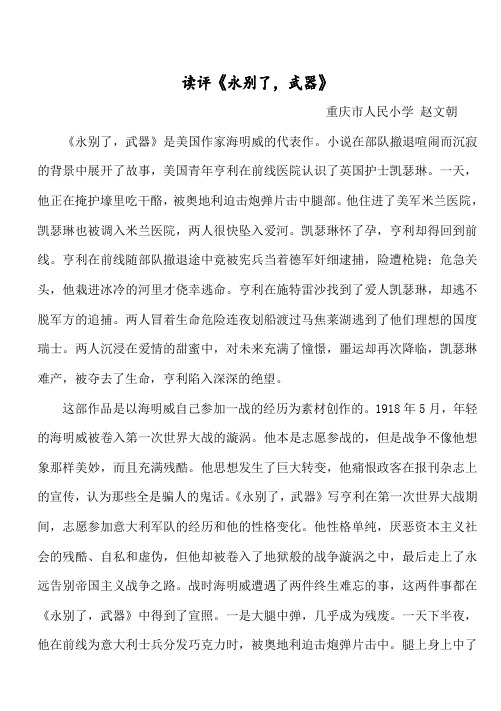
读评《永别了,武器》重庆市人民小学赵文朝《永别了,武器》是美国作家海明威的代表作。
小说在部队撤退喧闹而沉寂的背景中展开了故事,美国青年亨利在前线医院认识了英国护士凯瑟琳。
一天,他正在掩护壕里吃干酪,被奥地利迫击炮弹片击中腿部。
他住进了美军米兰医院,凯瑟琳也被调入米兰医院,两人很快坠入爱河。
凯瑟琳怀了孕,亨利却得回到前线。
亨利在前线随部队撤退途中竟被宪兵当着德军奸细逮捕,险遭枪毙;危急关头,他栽进冰冷的河里才侥幸逃命。
亨利在施特雷沙找到了爱人凯瑟琳,却逃不脱军方的追捕。
两人冒着生命危险连夜划船渡过马焦莱湖逃到了他们理想的国度瑞士。
两人沉浸在爱情的甜蜜中,对未来充满了憧憬,噩运却再次降临,凯瑟琳难产,被夺去了生命,亨利陷入深深的绝望。
这部作品是以海明威自己参加一战的经历为素材创作的。
1918年5月,年轻的海明威被卷入第一次世界大战的漩涡。
他本是志愿参战的,但是战争不像他想象那样美妙,而且充满残酷。
他思想发生了巨大转变,他痛恨政客在报刊杂志上的宣传,认为那些全是骗人的鬼话。
《永别了,武器》写亨利在第一次世界大战期间,志愿参加意大利军队的经历和他的性格变化。
他性格单纯,厌恶资本主义社会的残酷、自私和虚伪,但他却被卷入了地狱般的战争漩涡之中,最后走上了永远告别帝国主义战争之路。
战时海明威遭遇了两件终生难忘的事,这两件事都在《永别了,武器》中得到了宣照。
一是大腿中弹,几乎成为残废。
一天下半夜,他在前线为意大利士兵分发巧克力时,被奥地利迫击炮弹片击中。
腿上身上中了两百多片碎弹片,在医院住了三个月,动了十几次手术,才保住了腿。
《永别了,武器》(上海译文出版社1995年7月第一版。
下文引用此书句子系同一版本)42-47页写亨利受伤差不多就是他当年情景再现。
“我努力呼吸,可是没法子呼吸,只觉得灵魂冲出了躯体,往外飘,往外飘,一直在风中飘……我想动,但是动不了……我的膝盖没了。
”还有就是他的初恋。
在疗养期间,海明威结识了一位比他大的美国护士,但战后恋人另嫁他人。
〖2021年整理〗《拓展阅读永别了武器结尾》优秀教案

永别了武器(结尾)海明威店里的人。
忽然间我知道我得回去了。
我喊堂倌,付了账,穿上外衣戴上帽子,往门外走。
我冒雨赶到医院。
到了楼上,我碰见护士正走下长廊来。
“我刚刚打电话到旅馆去找你,”她说。
我心里边好像有样什么东西沉了下去。
“出了什么事?”“亨利夫人出血。
”“我可以进去吗?”“不,还不可以。
医生在里边。
”“是不是危险?”“很危险。
”护士走进房去,把门关上。
我坐在外边长廊上。
我心里所有的都掉了。
我不想。
我不能想。
我知道她要死了,我祈祷叫她别死。
别让她死。
哦,上帝啊,求你别让她死。
只求你别让她死,我什么都答应。
亲爱的上帝,我求你,求求你,求求你,别让她死。
亲爱的上帝,别让她死。
求你,求求你,求求你,别让她死。
神啊,求你叫她不死。
只要你别让她死,你说什么我都做。
婴孩你已经拿走了,但是别让她死。
孩子没有关系,但是别让她死。
求你,求求你,亲爱的上帝,别让她死。
护士开了门,用手指招招我,叫我进去。
我跟她进入房间。
我进去时,卡萨玲的头没抬起来。
我走到床边。
医生站在床的另外一边。
卡萨玲望着我,笑了一下。
我俯伏在床上哭起来。
“可怜的宝贝,”卡萨玲轻悄悄地说。
她的脸灰白。
“你不要紧,卡,”我说。
“你会好起来的。
”“我要死了。
”她说;等一会儿,又说,“我憎恨死。
”我抓住她的手。
“别碰我,”她说。
我放开她的手。
她要碰就碰吧。
“你不要紧,卡。
我知道你不要紧的。
”“我本想写封信留给你,以防万一,可是又没写。
”“要不要找个教士或是什么人来看看你?”“有你在就够了,”她说。
过一会儿,又说,“我不害怕,我只是憎恨死。
”“你话别讲得太多了,”医生说。
“好的,”卡萨玲说。
“你有什么事要我做的没有,卡?有没有什么要我给你拿来的?”卡萨玲笑一笑,“没有。
”等一会儿,又说:“我们做的事你不会再和别的女人做吧?不会把我们的话又讲一遍的吧?”“永远不会。
”“不过,我还是要你接近女人。
”“我不要她们。
”“你讲得太多啦,”医生说。
“你不可以讲话。
《永别了,武器》中所体现的荒诞性
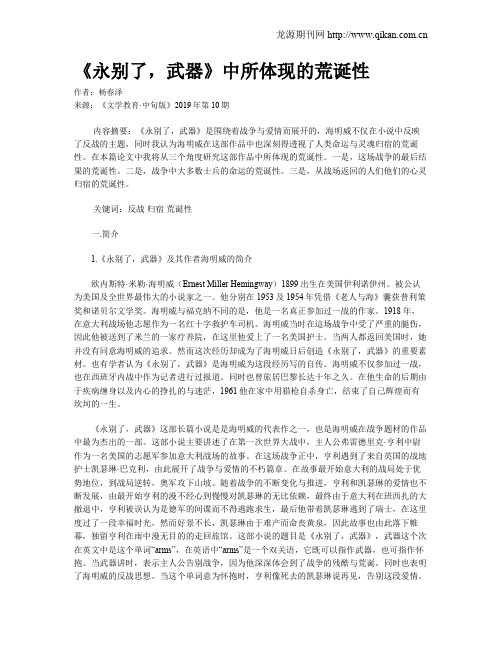
《永别了,武器》中所体现的荒诞性作者:杨春泽来源:《文学教育·中旬版》2019年第10期内容摘要:《永别了,武器》是围绕着战争与爱情而展开的,海明威不仅在小说中反映了反战的主题,同时我认为海明威在这部作品中也深刻得透视了人类命运与灵魂归宿的荒诞性。
在本篇论文中我将从三个角度研究这部作品中所体现的荒诞性。
一是,这场战争的最后结果的荒诞性。
二是,战争中大多数士兵的命运的荒诞性。
三是,从战场返回的人们他们的心灵归宿的荒诞性。
关键词:反战归宿荒诞性一.简介1.《永别了,武器》及其作者海明威的简介欧内斯特·米勒·海明威(Ernest Miller Hemingway)1899出生在美国伊利诺伊州。
被公认为美国及全世界最伟大的小说家之一。
他分别在1953及1954年凭借《老人与海》囊获普利策奖和诺贝尔文学奖。
海明威与福克纳不同的是,他是一名真正参加过一战的作家。
1918年,在意大利战场他志愿作为一名红十字救护车司机。
海明威当时在這场战争中受了严重的腿伤,因此他被送到了米兰的一家疗养院,在这里他爱上了一名美国护士。
当两人都返回美国时,她并没有同意海明威的追求。
然而这次经历却成为了海明威日后创造《永别了,武器》的重要素材。
也有学者认为《永别了,武器》是海明威为这段经历写的自传。
海明威不仅参加过一战,也在西班牙内战中作为记者进行过报道。
同时也曾旅居巴黎长达十年之久。
在他生命的后期由于疾病缠身以及内心的挣扎的与迷茫,1961他在家中用猎枪自杀身亡,结束了自己辉煌而有坎坷的一生。
《永别了,武器》这部长篇小说是是海明威的代表作之一,也是海明威在战争题材的作品中最为杰出的一部。
这部小说主要讲述了在第一次世界大战中,主人公弗雷德里克·亨利中尉作为一名美国的志愿军参加意大利战场的故事。
在这场战争正中,亨利遇到了来自英国的战地护士凯瑟琳·巴克利,由此展开了战争与爱情的不朽篇章。
《永别了,武器》中的象征主义的分析
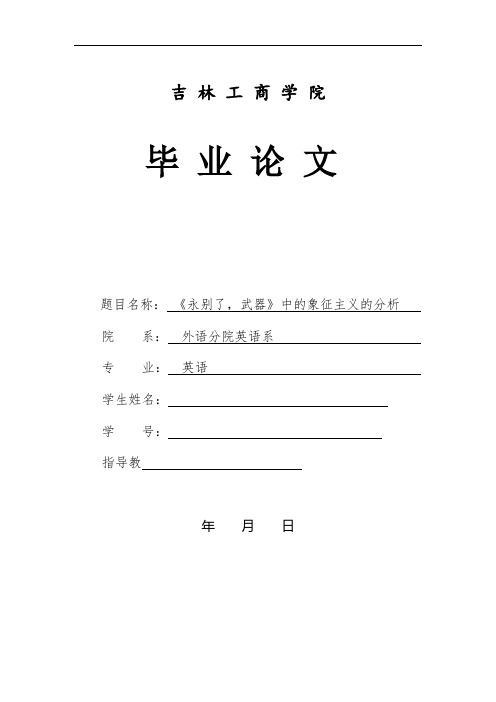
吉林工商学院毕业论文题目名称:《永别了,武器》中的象征主义的分析院系:外语分院英语系专业:英语学生姓名:学号:指导教年月日毕业论文原创性声明本人郑重声明:所呈交毕业论文,是本人在指导教师的指导下,独立进行研究工作所取得的成果。
除文中已经注明引用的内容外,本论文不包含任何其他人或集体已经发表或撰写过的作品成果。
对本文的研究做出重要贡献的个人和集体,均已在文中以明确方式标明。
本人完全意识到本声明的法律结果由本人承担。
论文作者签名:年月日《永别了,武器》中的象征主义分析摘要:海明威是西方文学史上最杰出的小说家之一。
他的作品主要以象征主义手法见长。
在他的作品《永别了,武器》中,海明威运用了象征主义手法,在不同的场景下,对雨,雪,高山,平原,和人物赋予各种不同的含义,来渲染出战争的无情,悲凉,凄惨,萧条的气氛,衬托了战争背景下的人们郁闷,无助和绝望的种种情绪。
书中,天气,景物仍是小说不可或缺的自然环境的一部分,但却不再是单纯的自然现象,而是作为暗示主人公遭遇的象征.人物的象征意义也特别的强烈。
本论文详细分析了其中的高山、平原、雨、雪和人物所表达的象征意义,并解读其在作品中的意义和价值。
关键词:象征主义;地点;天气;象征性的人物Symbolism in a farewell to armsAbstract:Hemingway, one of the most brilliant novelists in the history of the western literature, is famous for his symbolism. In the novel A Farewell to Arms, he applied the symbolism under different scenes, which endows rain, snow, mountain, plain, and water with different kinds of implication to highlight the ruthless, sad, miserable and desolate atmosphere of the war and discloses the people's depression, helplessness and desperation in the war. In addition, the characters also have the strong symbolic meaning. Therefore, this paper mainly analyzes the symbolic meanings of the mountain,plain,rain,snow and the characters in the novel,and interprets their significance and value in the appreciation of the novel.Key words: symbolism; landscapes; weather; emblematic people目录一、内容简介 (XX)(一)《永别了,武器》故事梗概 (XX)(二)象征主义的含义 (XX)二、自然景物的象征意义 (XX)(一)高山的象征意义 (XX)(二)平原的象征意义 (XX)三、天气象征意义 (XX)(一)“雨”的象征意义 (XX)(二)“雪”的象征意义 (XX)四、人物的象征意义 (XX)(一)凯瑟琳的象征意义 (XX)(二)神父和雷纳第的象征意义 (XX)五、结论·························································· ()参考文献 (XX)一、内容简介(一)《永别了,武器》,故事梗概《永别了,武器》(A Farewell to Arms),又译《战地春梦》,是美国作家欧内斯特·海明威于1929年写成的半自传体小说。
探寻海明威《永别了武器》中的写作特点与象征作用
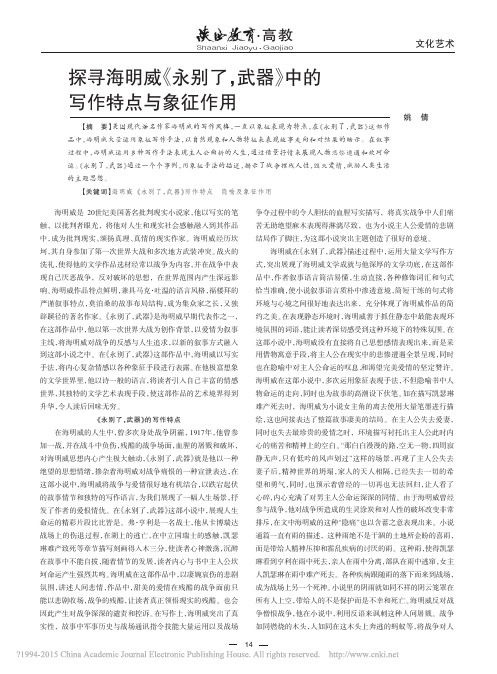
14u·Gaojiao
文化艺术
类的破坏,形象地表达出来,也为整部作品主旋律进行定位。 《永别了,武器》的象征作用
海明威在“永别了,武器”中大量运用象征写作手法,将自 己内心独白和小说主人公坎坷命运,以自然象征和人物描写刻 画来进行表述。在小说中,自然的环境并不单纯体现,而是与人 物命运紧密相连。通过作者有意地暗示,提升了作品中人物形 象和意义。
争夺过程中的令人胆怯的血腥写实描写,将真实战争中人们痛 苦无助绝望麻木表现得淋漓尽致,也为小说主人公爱情的悲剧 结局作了脚注,为这部小说突出主题创造了很好的意境。
海明威在《永别了,武器》描述过程中,运用大量文学写作方 式,突出展现了海明威文学成就与他深厚的文学功底,在这部作 品中,作者叙事语言简洁易懂,生动直接,各种修饰词汇和句式 恰当准确,使小说叙事语言质朴中渗透意境,简短干练的句式将 环境与心境之间很好地表达出来,充分体现了海明威作品的简 约之美。在表现静态环境时,海明威善于抓住静态中最能表现环 境氛围的词语,能让读者深切感受到这种环境下的特殊氛围。在 这部小说中,海明威没有直接将自己思想感情表现出来,而是采 用借物寓意手段,将主人公在现实中的悲惨遭遇全景呈现,同时 也在隐喻中对主人公命运的叹息,和渴望完美爱情的坚定赞许。 海明威在这部小说中,多次运用象征表现手法,不但隐喻书中人 物命运的走向,同时也为故事的高潮设下伏笔。如在描写凯瑟琳 难产死去时,海明威为小说女主角的离去使用大量笔墨进行描 绘,这也间接表达了整篇故事凄美的结局。在主人公失去爱妻, 同时也失去最珍贵的爱情之时,环境描写衬托出主人公此时内 心的痛苦和精神上的空白。“那白白漫漫的路,空无一物,四周寂 静无声,只有低吟的风声划过”这样的场景,再现了主人公失去 妻子后,精神世界的坍塌,家人的天人相隔,已经失去一切的希 望和勇气,同时,也预示着曾经的一切再也无法回归,让人看了 心碎,内心充满了对男主人公命运深深的同情。由于海明威曾经 参与战争,他对战争所造成的生灵涂炭和对人性的破坏改变非常 排斥,在文中海明威的这种“隐痛”也以含蓄之意表现出来。小说 通篇一直有雨的描述,这种雨绝不是干涸的土地所企盼的喜雨, 而是带给人精神压抑和霍乱疾病的讨厌的雨。这种雨,使得凯瑟 琳看到亨利在雨中死去,亲人在雨中分离,部队在雨中逃窜,女主 人凯瑟琳在雨中难产死去。各种疾病跟随雨的落下而来到战场, 成为战场上另一个死神。小说里的阴雨就如同不祥的阴云笼罩在 所有人上空,带给人的不是保护而是不幸和死亡。海明威反对战 争憎恨战争,他在小说中,利用反语来讽刺这种人间屠戮。战争 如同燃烧的木头,人如同在这木头上奔逃的蚂蚁等,将战争对人
- 1、下载文档前请自行甄别文档内容的完整性,平台不提供额外的编辑、内容补充、找答案等附加服务。
- 2、"仅部分预览"的文档,不可在线预览部分如存在完整性等问题,可反馈申请退款(可完整预览的文档不适用该条件!)。
- 3、如文档侵犯您的权益,请联系客服反馈,我们会尽快为您处理(人工客服工作时间:9:00-18:30)。
读《永别了武器》有感
这部小说是海明威作品成熟的标志。
全书以一战为背景,讲述了一个美国青年在战争中的爱情故事。
海明威在故事一开始就以其细腻的笔调描绘了一幅战争中村庄凄凉冷清的景象,主人公弗雷德里克·亨利在第一次世界大战期间志愿到意大利北部战争担任救护车驾驶员,期间与英国护士凯瑟琳·巴克莱相识。
亨利在前线执行任务时被炮弹炸伤,被送往后方的米兰医院就医。
由于护士紧缺,凯瑟琳也来到了米兰,两人又一次相遇。
这一次,亨利发现自己已经深深地爱上了巴克莱小姐。
在此期间,两人处于热恋之中,度过了一段美好的时光。
这期间,凯瑟琳怀孕了。
亨利伤愈返回前线,发现意军士气大跌,处处充斥着失败与绝望的情绪。
德国人的进攻,终于击垮了意军的抵抗,意军开始溃退;士兵们的情绪很激动,反战热情高涨。
在一座桥前,意军前线宪兵部队开始逮捕所谓擅离职守的军官,并无一幸免地加以枪决,亨利不幸也在其中。
借着审问其他人的时机,亨利跳进河流,得以逃脱被处决的命运。
他终于意识到,自己作为一名士兵的义务已经连同河水一起被冲走了。
此时的他,只有一个目的,那就是找到凯瑟琳,然后两人逃离战争的苦海。
亨利辗转来到了米兰,发现凯瑟琳已去边境一度假小城。
亨利找到凯瑟琳以后,两人再次幸福地相聚。
可是,随后意大利警察的追捕,使得他们不得不逃往瑞士。
亨利和凯瑟琳在瑞士度过了一段幸福的时光,但最终,凯瑟琳还是在难产中死去,故事也在亨利冒雨走回旅馆中戛然而止,使作者赋予作品的潜在感情到达了最高潮。
这个结果有些出乎我的意料,然而处在那一时代,这种种的不幸也就在所难免,因为战争本来就是人类的不幸。
爱情之花就这样凋谢,不禁令人惋惜。
从整个故事来看,海明威是写出了人们对于这场摧残爱情、摧残人性的的战争从投入到怀疑到厌恶继而到冷漠麻木的过程,反映了第一次世界大战后玩世不恭、信仰危机的“迷茫一代”的精神面貌。
厌恶战争,又无法制止战争;看不见希望,又不愿意抛弃希望,在绝望中找不到个人出路,这正是二十年代海明威的精神实质。
在《永别了,武器》中,主人公亨利有个比喻:人如同木头上的蚂蚁,一头着了火,便纷纷涌向另一头,最后还是葬身火海中。
这个比喻成了海明威悲剧意识的形象写照,他把自己的亲身感受和悲剧意识融入作品中,写出了这一代人失落的情绪,体现了自己迷惘的人生观。
海明威把战争的残忍与个人的幸福对照起来描写,他以冷静、客观、简练的笔触,描写亨利与凯瑟琳如何从开始邂逅相遇时的玩世不恭逐渐发展为—种心心相印的纯洁、真诚的关系,以及这种美好的爱情又如何一步步被战争毁灭。
海明威从事件、人物甚至气氛上为这一悲剧的进程做了层层铺垫与渲染,如伴随着主人公的那种阴冷、凄凉的氛围,淅沥不断的雨,亨利阴郁的心情.凯瑟琳不祥的预兆等等,在为他们真挚的爱情所感动的同时又为他们的命运而担忧。
海明威愈是强调个人幸福的美好和值得追求,那么从这种个人幸福的被毁灭,就愈见战争的可怕与罪恶。
这里个人的幸福正象征着整个美好、和谐的人生,无数个人幸福的集合便是人生的目标。
这样,海明威就把战争作为整个人类悲剧的制造者来加以谴责,从而获得了更深的意义。
战争,一个当今世界都不可避免的话题。
战争是人类创造的,他们用自己创造出来的武器制造了战争,“永别了,武器”或许只是一个美好的愿望。
然而人类本身也是战争的受害者,人们反战的情绪既是强烈的,又是普遍的。
亨利、凯瑟琳和他们的朋友既是战争的受害者,又是战争的反对者,从士兵到长官,从伤员到医护人员,几乎人人都厌恶战争,痛恨战争,诅咒战争。
这种从一代人角度发出的大声疾呼在客观上表达了对帝国主义战争的强烈谴责。
《永别了,武器》把季节气候的交换和战事的胜败,主人公的心情变化有机地结合起来,
在叙述的技巧上采用短小、精干的句子,以凝炼的文笔勾勒人物,传达思想,体现了独特的海明威风格,有着较高的艺术性。
值得我们细细品味,反复阅读体会。
